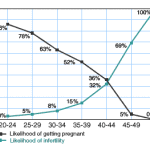The sooner the better: Age and Fertility
More women are having babies over the age of 35 than ever before. Yet from a biological perspective, it is best to start trying before you reach 35. Here are some of the reasons why:
Your age affects fertility
Fertility starts to decline for women at about the age of 30, dropping down more steeply after the age of 35. After age 35 years, the proportion of women who experience infertility increases. By the age of 40 only two in five of those who wish to have a baby will be able to do so. Even for those who are using in vitro fertilization, the success of women using their own eggs has remained steady.
The chart below shows your chances of getting pregnant according to your age. The chart is only a guide. It shows average figures for women in the best of health.

Source: Management of the Infertile Woman by Helen A. Carcio and The Fertility Sourcebook by M. Sara Rosenthal
Why fertility declines
The two most common causes of female infertility are ovulation problems and blockage of the fallopian tubes. Ovulation problems can happen as you get older because you have fewer good quality eggs left, making it more difficult to conceive. As you approach menopause, your periods may become irregular, making ovulation irregular too. A few women (1%) go through menopause earlier than usual and stop ovulating before they reach the age of 40. Blockages to the fallopian tubes may be caused by infection or endometriosis. Fibroids are more common in women over 30 and may cause fertility problems for some women. Even the extra weight women put on as they age can make it more difficult to become pregnant. Age and fertility are most certainly linked and if there is anything we can do to help make your family plans a reality, we are here to help.








